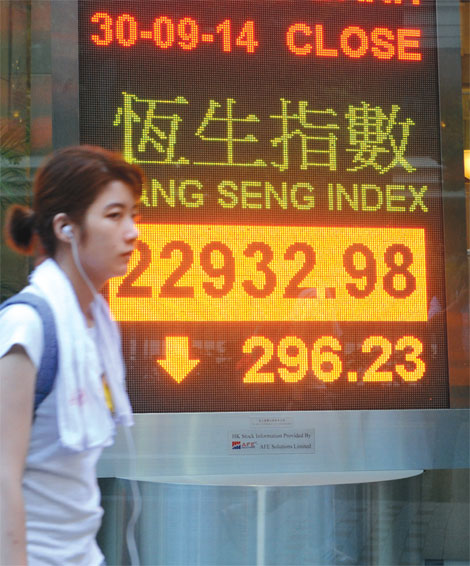'One Country', 'Two Systems' vital to HK
By Zhang Yuwei in New York and Liu Chang in Washington (China Daily USA) Updated: 2014-10-02 11:25Hong Kong must capitalize on the combined advantages of "One Country" and "Two Systems" - which also fully applies to the Special Administrative Region's constitutional development -- to sustain its development, said Hong Kong Chief Executive C Y Leung on Wednesday.
Speaking at the National Day reception, Leung said the Standing Committee of the National People's Congress has adopted a decision on issues relating to the selection of the Chief Executive (CE) by universal suffrage, confirming that the CE can be elected through "one person, one vote" from 2017 onward.
"It is understandable that different people may have different ideas about a desirable reform package. But it is definitely better to have universal suffrage than not. It is definitely better to have the CE elected by five million eligible voters than by 1,200 people," Leung said.
|
Hong Kong stock market closed down 296.23 points, or 1.28 percent to 22,932.98 points on Tuesday. Xinhua |
Leung said that Under "One Country", Hong Kong has the staunch support of the country for its development, while the huge mainland market presents the city with numerous career opportunities.
As the ongoing "Occupy Central" protest in Hong Kong goes on, protesters call for the withdrawal of the decision on Hong Kong's constitutional development on Hong Kong's electoral reform by the National People's Congress Standing Committee.
Thousands of activists continue to occupy the central business area of the city. Some schools have been closed and some banks have suspended operations, including in the key business zones in Mong Kok, Admiralty and Causeway Bay.
Stephen Orlins, president of New York-based National Committee on US-China Relations, said the best thing for the government to do is to "do nothing".
A "tactical error" was made by the police when they used tears gas and pepper spray on protesters, said Orlins, adding that it brought out more protestors and increased the size of the demonstration.
"It's important that it will not happen again," said Orlins. "Unless the protesters are violent, the government should avoid using unnecessary force."
"I think the chief executive is doing a good job by saying 'you are entitled to protest but you are not entitled to occupy government buildings'," Orlins noted.
Orlins, who lived in Hong Kong before and after its handover to China for almost eight years between the 1980s and 2000s, said the ongoing demonstration will affect the lives of people in Hong Kong, which is a "conservative society".
"I sympathize with the demonstrators however I also lived under the British rule, when we had no voice in the selections of governors - they were not from Hong Kong and they were not Chinese," said Orlins.
With more than 42 bus routes and some tram services suspended, many Hong Kong residents' daily lives have been disrupted by protestors in various districts. The stock market in Hong Kong saw a continuing three-week decline as of Tuesday.
"The significant instability will make the majority of the population become deeply concerned what I worry about in the long term is that Hong Kong as a financial center," said Orlins.
Samuel Mok, chief financial officer of the US Department of Labor who was raised in Hong Kong, said he is "neither optimistic nor pessimistic" about the protest but "confused".
"I am confused because I do not know where were these 'protestors' and 'demanders' for 'democracy' when the British people were ruling Hong Kong and over many of these same people," said Mok.
Mok said the government has been too hands-off on Hong Kong, which is part of China.
"Many of these people also seem to forget that Hong Kong is part of China and that will not change regardless of how many days the protest lasted or how many people join in the protest," said Mok.
Xinhua contributed to the story.
Contact the writers at yuweizhang@chinadailyusa.com and liuchang@chinadailyusa.com
- Govt encourages people to work 4.5 days a week
- Action to be taken as HIV cases among students rise
- Debate grows over reproductive rights
- Country's first bishop ordained in 3 years
- China builds Tibetan Buddhism academy in Chengdu
- Authorities require reporting of HIV infections at schools
- Typhoon Soudelor kills 14 in East China
- Police crack down on overseas gambling site
- Debate over death penalty for child traffickers goes on
- Beijing to tighten mail security for war anniversary








